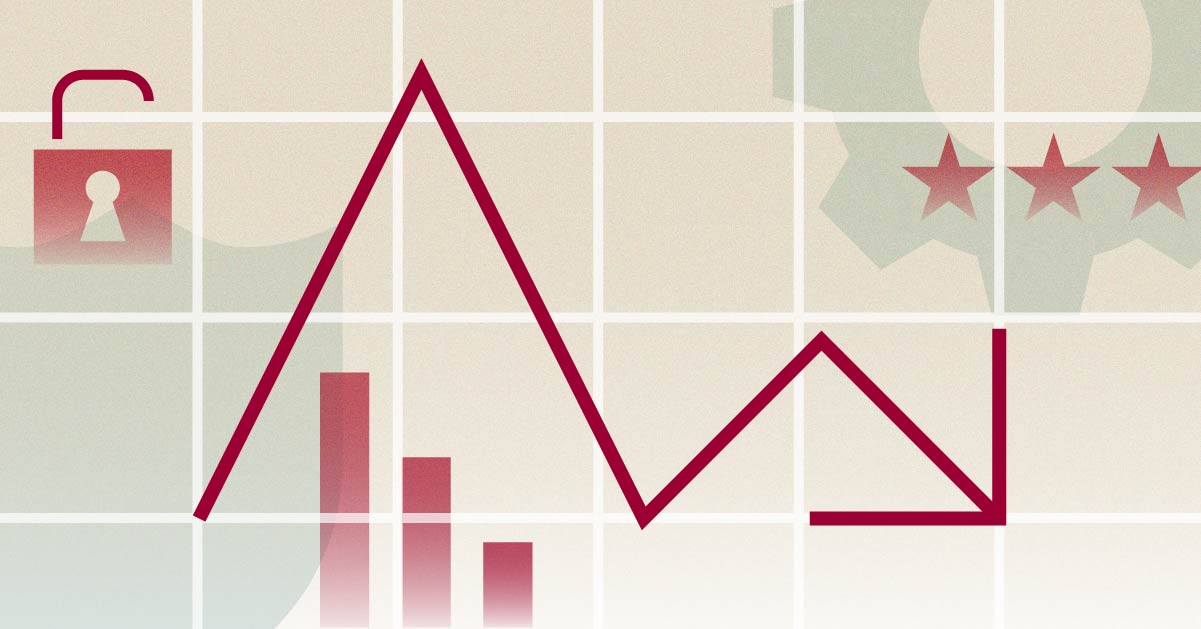
Recession fears continue to jostle the stock market this year—and for good reason. Central banks have indicated that they remain laser-focused (for now) on pushing down inflation by raising interest rates. Companies are cutting jobs and jettisoning underperforming projects in the face of economic uncertainty.
Given the threat of an economic downturn (whether short-lived or longer-lasting), investors might want to know what types of stocks to buy during a recession.
What Are Recession-Resistant Stocks?
Recession-resistant stocks are stocks of companies whose products and services consumers will continue to purchase no matter the economic climate. In a slowing economy, consumers will generally still fill their prescriptions, seek medical care, practice good hygiene, and enjoy their favourite beverages and snacks. They’ll also continue to pay for running water, electricity, and gas to heat their homes.
In addition, recession-proof companies tend to be financially healthy and highly profitable—two qualities that are prized when economic times get tough. Such companies often have competitive advantages that allow them to maintain reliable cash flows over time, regardless of what’s going on in the economy. As a result, shares of these companies can be good stocks to own during a recession.
How to Find Recession-Proof Stocks
Stocks that meet this definition of “recession-resistant” often share these qualities.
These stocks earn wide Morningstar Economic Moat Ratings: Stocks that have durable competitive advantages, or economic moats, are by their very natures more reliable than no-moat companies in terms of their businesses. Wide-moat companies are financially healthy and highly profitable, two qualities that are prized when the economy is rough.
These stocks have Low or Medium Morningstar Uncertainty Ratings: The Uncertainty Rating represents the predictability of a company’s future cash flows. As such, we have a pretty high degree of confidence in our fair value estimates of stocks from companies with Low and Medium Uncertainty Ratings.
10 Undervalued Stocks for a Recession
These were the 10 most undervalued stocks as of Jan. 20, 2023, that Morningstar’s analysts cover and fit our definition of recession-resistant.
1) Anheuser-Busch InBev BUD
2) Roche Holdings RHHBY
3) GSK GSK
4) Zimmer Biomet Holdings ZBH
5) Medtronic MDT
6) Ambev ABEV
7) Imperial Brands IMBBY
8) Bayer BAYRY
9) British American Tobacco BTI
10) Dominion Energy D
Here’s a little bit about each of these stocks, along with some key Morningstar metrics. All data is as of Jan. 20, 2023.
Anheuser-Busch InBev
Price/fair value: 0.66
Morningstar Uncertainty Rating: Medium
Morningstar Economic Moat Rating: Wide
Sector: Consumer Defensive
Anheuser-Busch InBev stock is a buy, trading 34% below our fair value estimate. The largest brewer in the world, AB InBev benefits from a significant cost advantage relative to its competitors, which creates meaningful barriers to entry and therefore provides a substantial moat, says Morningstar director Philip Gorham. We think AB InBev stock is worth $90.
Roche Holding
Price/Fair Value: 0.70
Morningstar Uncertainty Rating: Low
Morningstar Economic Moat Rating: Wide
Sector: Healthcare
Roche stock is 30% undervalued, according to our measures. Roche is a biopharmaceutical and diagnostic company that holds the leadership position in both oncology therapeutics and in vitro diagnostics; as a result, the drugmaker earns a wide moat rating, says Morningstar sector strategist Karen Andersen. We assign Roche stock a US$57 fair value estimate.
GSK
Price/Fair Value: 0.71
Morningstar Uncertainty Rating: Medium
Morningstar Economic Moat Rating: Wide
Sector: Healthcare
GSK stock looks mispriced, as shares trade 29% below what we think they’re worth. GSK is one of the largest pharmaceutical and vaccine companies worldwide by total sales. Patents, economies of scale, and a powerful distribution network support the drugmaker’s wide moat rating, argues Damien Conover, director of healthcare equity research for Morningstar. We think GSK stock’s fair value is $50.
Zimmer Biomet Holdings
Price/Fair Value: 0.71
Morningstar Uncertainty Rating: Medium
Morningstar Economic Moat Rating: Wide
Sector: Healthcare
Zimmer Biomet stock looks cheap by our metrics, selling 29% below our fair value estimate. Zimmer manufactures orthopedic reconstructive implants. We award the company a wide moat rating thanks in part to the high switching costs that orthopedic surgeons would face if they transitioned to another company’s instrumentation, says Morningstar senior analyst Debbie Wang. We think Zimmer Biomet stock is worth $175.
Medtronic
Price/Fair Value: 0.72
Morningstar Uncertainty Rating: Medium
Morningstar Economic Moat Rating: Wide
Sector: Healthcare
Medtronic stock is 28% undervalued. One of the largest medical device companies focused on therapeutic medical devices for chronic diseases, Medtronic (like Zimmer) enjoys high switching costs. Its intellectual property and relationship with physicians also contribute to its wide moat, says Morningstar’s Wang. We assign Medtronic stock a $112 fair value estimate.
Ambev
Price/Fair Value: 0.74
Morningstar Uncertainty Rating: Medium
Morningstar Economic Moat Rating: Wide
Sector: Consumer Defensive
Ambev stock looks 26% undervalued according to our metrics. The largest brewer in Latin America by volume, Ambev benefits from cost advantages in markets where it holds a commanding volume share; it’s a highly profitable business, says Morningstar’s Gorham. We think Ambev stock is worth US$3.50.
Imperial Brands
Price/Fair Value: 0.75
Morningstar Uncertainty Rating: Medium
Morningstar Economic Moat Rating: Wide
Sector: Consumer Defensive
Imperial Brands stock trades 25% below our fair value estimate. One of the world’s largest international tobacco companies, Imperial Brands benefits from tight government regulations that make barriers to entry almost insurmountable, says Gorham. That and brand loyalty support the company’s wide moat. We assign Imperial Brands stock a US$34 fair value estimate.
Bayer
Price/Fair Value: 0.77
Morningstar Uncertainty Rating: Medium
Morningstar Economic Moat Rating: Wide
Sector: Healthcare
Bayer stock is selling 23% below what we think it’s worth. The German healthcare and agriculture conglomerate has carved out a wide moat largely on the strength of its healthcare group, with key drugs in hemophilia and ophthalmology, as well as a consumer business that includes brands such as Bayer Aspirin and Aleve, says Morningstar’s Conover. We give the stock a US$20 fair value.
British American Tobacco
Price/Fair Value: 0.78
Morningstar Uncertainty Rating: Medium
Morningstar Economic Moat Rating: Wide
Sector: Consumer Defensive
British American Tobacco stock is cheap, trading 22% below our fair value estimate. One of the two largest listed global tobacco companies, it possesses a strong franchise and cost advantages, which have led to a wide moat rating, says Gorham. We think British American Tobacco stock is worth US$50 per share.
Dominion Energy
Price/Fair Value: 0.80
Morningstar Uncertainty Rating: Medium
Morningstar Economic Moat Rating: Wide
Sector: Utilities
Dominion Energy stock appears to be about 20% undervalued according to our metrics. The integrated energy company operates in a constructive regulatory environment and is pursuing a sizable growth plan in the next five years focused on decarbonization, says Morningstar senior analyst Andrew Bischof. We assign Dominion Energy stock a fair value estimate of US$78.




















